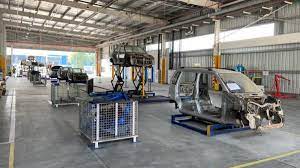31 Mar , 2022 By : monika singh

More awareness needs to be created around the vehicle scrapping process, particularly about government-authorised facilities catering to scientific and environment-friendly scrapping and recycling of end-of-life vehicles, Maruti Suzuki Toyotsu India (MSTI) managing director Masaru Akaishi, said.
A 50:50 joint venture between the country’s largest passenger vehicle manufacturer — Maruti Suzuki India, and Toyota Tsusho Group — MSTI was established in October 2019. Its maiden government-approved end-of-life vehicle scrapping and recycling facility, located in Noida, was inaugurated in November 2021.
“Since the inauguration, we have received and processed almost 120 vehicles. I think once the customers start getting the incentives, the volumes will go up,” Akaishi said.
Built with an investment of more than Rs 44 crore, the 10,993-square metre MSTI Noida facility can scrap and recycle over 24,000 end-of-life vehicles annually. At present, it can scrap end-of-life passenger vehicles, two-wheelers and three-wheelers.
MSTI provides a destruction certificate after dismantling the vehicle. While the payout amount individuals get varies from vehicle to vehicle, the normal range for scrapped units is from Rs 25,000 to Rs 80,000.
“We need to have more awareness among the individuals about the vehicle scrapping process. Many people are still unaware that such facilities are now in India, where vehicle scrapping and recycling is done in a scientific and environment-friendly manner,” Akaishi said.
With no discharge of oils and gases into the air or ground, the MSTI Noida facility claims to recover 95% to 97% scrap from an end-of-life vehicle.
“All scrapped material is sent to government authorised recyclers, steel mills or smelters for eco-friendly recycling,” Akaishi noted.
MSTI will set up a vehicle recycling plant in Gujarat by 2025 with an investment of Rs 45 crore. This will be part of an overall investment of Rs 10,445 crore in the state by 2026 by Suzuki Motor Corporation, the parent company of Maruti Suzuki India, for locally manufacturing battery electric vehicles (BEVs) as well as batteries for them.
Battery electric vehicles, hybrid electric vehicles, plug-in hybrid electric vehicles and fuel cell electric vehicles are among the different types of EVs available at present.
Apart from MSTI, Cero, a joint venture between Mahindra Accelo and government of India’s MSTC, is another authorised end-of-life vehicle recycler. The company has dismantling centres in Greater Noida, Pune and Chennai. Besides, it also has collection centres in Mumbai, Bengaluru, Hyderabad, Ahmedabad, Jaipur and Chandigarh.
Tata Motors has also inked pacts with the Gujarat and Maharashtra governments to set up a registered vehicle scrapping facility in each state. The Gujarat facility, to be located in Ahmedabad, will have the capacity to recycle up to 36,000 vehicles annually, while the Maharashtra facility will have a vehicle recycling capacity of around 35,000 vehicles in a year.
Under the Vehicle Scrapping Policy, the Union government will facilitate the setting up of around 50-70 registered vehicle scrapping facilities across the country by 2026.
0 Comment